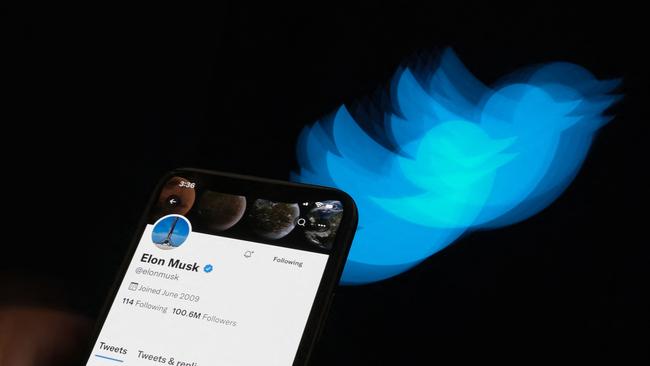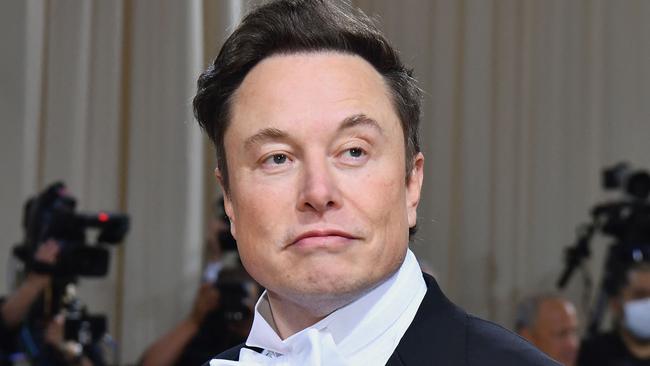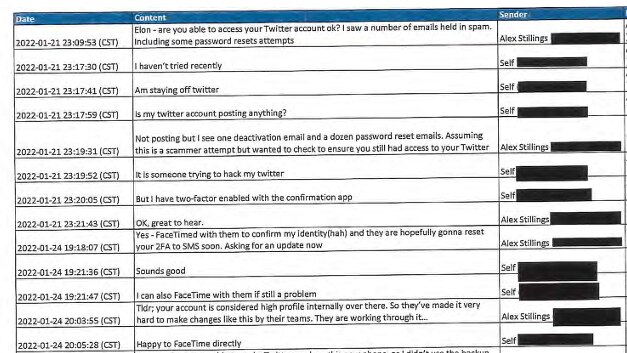Musk’s texts are now public – here’s what they say
The messages give an inside look at the collapse of Musk’s bid to buy Twitter, and exchanges with executives and prominent personalities.

Newly released text messages reveal an inside look at the collapse of Tesla billionaire Elon Musk’s bid to buy Twitter and the rapid breakdown in the relationship between him and Twitter executives, including chief executive Parag Agrawal.
It comes as the parties gear up for a high-stakes lawsuit that may force Mr Musk to follow through on his proposed $US44bn purchase of the tech giant.
The partially-redacted text exchanges, published in court documents via a pre-trial discovery process on Friday, show that Mr Musk’s public tweets criticising Twitter increasingly drew the ire of Mr Agrawal and other Silicon Valley stalwarts, including Twitter chairman Bret Taylor, who became frustrated with Mr Musk’s unpredictable behaviour.
“You are free to tweet ‘is Twitter dying?’ or anything else about Twitter — but it’s my responsibility to tell you that it’s not helping me make Twitter better in the current context,” Mr Agrawal said in a text message to Mr Musk on April 9.
“Next time we speak, I’d like to you [sic] provide you perspective on the level of internal distraction right now and how it [is] hurting our ability to do work. I hope the AMA will help people get to know you, to understand why you believe in Twitter, and to trust you — and I’d like the company to get to a place where we are more resilient and don’t get distracted, but we aren’t there right now.”
Mr Musk responded two minutes later with a message that read, “What did you get done this week? I‘m not joining the board. This is a waste of time. Will make an offer to take Twitter private.”

Both Mr Musk and Mr Agrawal will depose for the five-day trial, which will determine whether Mr Musk will be forced to follow through with his Twitter purchase.
The trial, in the Delaware Chancery Court in the US, will start on October 17.
The relationships started warmly.
When news broke that Mr Musk acquired 9 per cent of the company, Twitter co-founder Jack Dorsey texted him “couldn’t be happier you’re doing this,” and said that he now believed Twitter “should have never been a company. That was the original sin.”
Mr Musk also exchanged friendly messages with Mr Agrawal about his ideas for improving Twitter.

PDF: Read the exchange here.
“I have a ton of ideas, but lmk [let me know] if I’m pushing too hard,” Mr Musk texted Mr Agrawal on April 7. “I just want Twitter to be maximum amazing.”
“I want to hear all the ideas — and I’ll tell you which ones I’ll make progress on vs. not. And why,” Mr Agrawal responded.
At the same time, Mr Dorsey was praising Mr Agrawal, describing him as an ‘incredible engineer’ in a text on April 5 and attempting to help the pair work together.
“I want to make sure Parag is doing everything possible to build towards your goals until close,” Mr Dorsey wrote.
“He is really great at getting things done when tasked with a specific direction. Would it make sense for me, you, and him to get on a call to discuss next steps and get really clear on what’s needed? He’d be able to move fast and clear then. Everyone is aligned and this will help even more.”
Mr Musk and Mr Agrawal then met via Google Hangouts on April 26, a meeting Mr Dorsey described as ‘clarifying’.
“At least it became clear that you can’t work together,” Dorsey wrote later that same day. “That was clarifying.”
In May, Mr Musk soured on the deal, telling his banker Michael Grimes that they “slow down just a few days.”
“Putin’s speech tomorrow is extremely important,” Mr Musk wrote. “It won’t make sense to buy Twitter if we’re headed into WW3.”
He then attempted to ditch the deal altogether in July.
The text messages also reveal a bevy of powerful Silicon Valley executives and other personalities keen to help Mr Musk get the deal over the line.
“I REALLY hope you get Twitter. If you do, we should throw a hell of a party,” podcaster and UFC commentator Joe Rogan wrote in a text.
“Put me in the game coach!,” wrote investor and podcaster Jason Calacanis. “Twitter CEO is my dream job.”
Mr Musk also had exchanges with Axel Springer owner Mathias Döpfner and Oracle chief executive Larry Ellison about buying Twitter.
Mr Ellison committed $US2bn in financing towards the deal via text.
Mr Musk is now attempting to abandon the deal, declaring that as much as 90 per cent of Twitter comments are from bots or spam accounts, and that a significant portion of the platform’s 238 million daily active users aren’t real humans.
The executive tweeted an article from The Australian in September that quoted former CIA and FBI cyber security specialist Dan Woods, who said more than 80 per cent of Twitter accounts are likely bots.
Sure sounds higher than 5%!
— Elon Musk (@elonmusk) September 1, 2022
https://t.co/Va7TxxzoI6
“Sure sounds higher than 5%!,” Mr Musk wrote.
“On a $/bot basis, this deal is awesome.”
Mr Agrawal said in a Twitter thread that bots make up less than 5 per cent of its “monetisable daily active users”, while Mr Musk has said that number is false and the company “failed or refused to provide” further information about spam bots on its platform.
The text messages reveal journalists attempted – without success – to pin down Mr Musk for an interview about the saga.
“Gayle here! Have you missed me (smile) Are you ready for to do [sic] a proper sit down with me so much to discuss!,” broadcaster Gayle King wrote in a text message.
“Especially with your twitter play … what do I need to do ???? Ps I like a twitter edit feature with a 24 hour time limit … we all say shit we regret want to take back in the heat of the moment …”
Another wrote, “Hey Elon – my name is Jake Sherman. I’m a reporter with Punchbowl News in Washington – I cover Congress. Wonder if you’re game to talk about how twitter would change for politics if you were at the helm?,” to no response.
The trial begins next month.



To join the conversation, please log in. Don't have an account? Register
Join the conversation, you are commenting as Logout